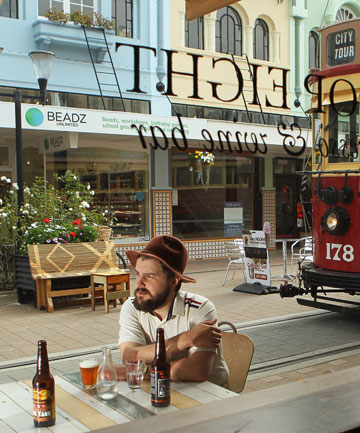
How do you go from a “stage animal” with a pop group who wakes up with no voice to a New York-destined opera star within five years
You quit pop music.
Or yodelling, if you’re Dame Malvina Major.
Waikato-based Major, who was professor of voice at the University of Canterbury when Oliver Sewell was a student, took him aside in 2009 and put in a hard word.
The Christchurch-raised singer was waking up on weekend mornings with no voice, from yelling on stage the night before with his band Tiny Paper Daggers.
If he wanted to get anywhere in opera, said a “horrified” Major, he had to make a call.
“I said to Ollie, ‘If you want to be really serious about it, then you are going to have to stop doing that’. I was kind of horrified that this beautiful voice was doing rock music,” she says.
When Major was 17, she had “precisely the same conversation” with her singing teacher – Sister Mary Leo, in Auckland, but instead of rock or pop, the offending genre was country music.
“She said, ‘Now, there will be no more yodelling’. If [Ollie] had not had a lovely voice, I would have said nothing,” she says.
Years down the line, Sewell, 24, is grateful.
“I was advised to maybe just concentrate on classical music. [Major] didn’t twist my arm,” he says.
“I think it was good advice – on reflection.”
And it paid off.
In August, he is heading to the Manhattan School of Music in the United States to start a two-year Masters in opera studies.
The course costs US$37,000 (NZ$42,800), and Sewell accepted a full scholarship two weeks ago.
He started playing the cello when he was 4, and until he was about 15, it was his main instrument. He soon started taking singing more seriously and by his final year at Burnside High School, he was getting paid to sing in the Christchurch Cathedral Choir. There, he experienced “turning up and doing the job”.
“When you are young everyone tells you how great you are but at some point it has got to become a job. The [Christ Church Cathedral Choir] was great for that.”
The choir, which Sewell stayed with throughout his bachelor of music in performance voice, also “softened” his secular edges and allowed him to him see “organised religion or at least Anglicanism in a different light”.
“The services allowed people to take a moment out of their busy day,” he says.
By 19, Sewell was on stage at the Christchurch Town Hall as a soloist with the Christchurch City Choir and the Christchurch Symphony Orchestra.
Ad Feedback
Back at high school, Sewell also pursued another hobby – making pop music.
Frankly Mauve, made up of Sewell, Tim Hardie, Tim King, Miles McDougall and Josiah Young, won the Canterbury regional Smokefreerockquest final in 2007 with their “indie-tronica/surf rock”.
At the national finals, Sewell was given the Best Vocals Award.
After high school, Frankly Mauve became Tiny Paper Daggers – minus Young, and the foursome gained popularity.
But by the time Major pulled him aside, Sewell was already questioning the pop scene.
“I got frustrated with it near the end, which helped. I could see Miles’ drive to do pop and I did not have that. Opera was more rewarding.
“You had to put a lot of work in, whereas with pop if you had a good hairstyle and a sexy synth line people loved it,” he says.
These days, Wellington-based Sewell spends most mornings in his bedroom learning opera lines.
He is an emerging artist with New Zealand Opera, which will take him on the road in June, performing in two operas.
In the afternoons, he gardens or becomes his vocal alter ego – Pip John.
Sewell started playing with looping software in his teens and creates ambient soundscapes layering his voice with made or found samples.
In 2012, during a “year of reflection and saving” – a year away from classical music – he released two EPs online, Dualism and Thomas & I.
“It’s a far more creative process than singing what someone else has written,” he says.
The same week Sewell accepted his scholarship to New York, an electronic track from his third EP – Emeralds, reached the top four on Christchurch’s RDU 98.5 FM.
It was a good week for “Oliver Sewell – singer”, he says. “You don’t have to devote yourself to one musical artform. They’re so different, mentally, for me. I put a helluva effort into both, but they don’t get in each other’s way.”
Sewell won’t be letting his vocal alter ego get in the way of his opera career.
“I do ‘oohs’ and ‘aahs’ very lightly. There’s a reason I do washy, stupid vocal lines that don’t utilise my voice. There’s a value on its health now,” he says. “I don’t have to sing, but I have chosen to. Responsibility comes with that.”
–